单项填空典型陷阱题透析
- 格式:doc
- 大小:45.00 KB
- 文档页数:3
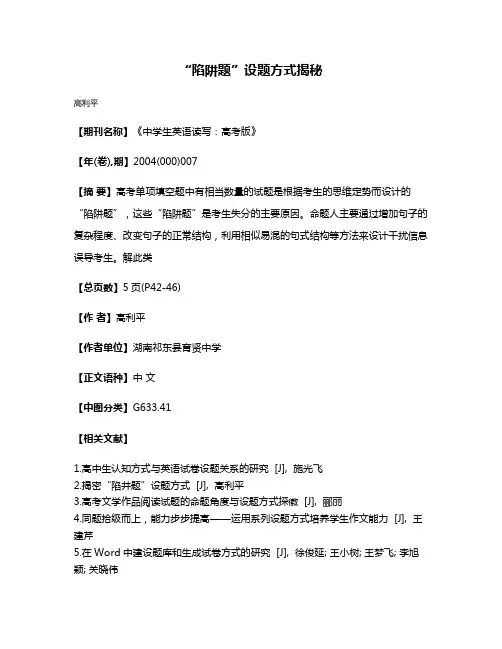
“陷阱题”设题方式揭秘
高利平
【期刊名称】《中学生英语读写:高考版》
【年(卷),期】2004(000)007
【摘要】高考单项填空题中有相当数量的试题是根据考生的思维定势而设计的“陷阱题”,这些“陷阱题”是考生失分的主要原因。
命题人主要通过增加句子的复杂程度、改变句子的正常结构,利用相似易混的句式结构等方法来设计干扰信息误导考生。
解此类
【总页数】5页(P42-46)
【作者】高利平
【作者单位】湖南祁东县育贤中学
【正文语种】中文
【中图分类】G633.41
【相关文献】
1.高中生认知方式与英语试卷设题关系的研究 [J], 施光飞
2.揭密“陷井题”设题方式 [J], 高利平
3.高考文学作品阅读试题的命题角度与设题方式探徽 [J], 郦丽
4.同题拾级而上,能力步步提高——运用系列设题方式培养学生作文能力 [J], 王建芹
5.在Word中建设题库和生成试卷方式的研究 [J], 徐俊延; 王小树; 王梦飞; 李旭颖; 关晓伟
因版权原因,仅展示原文概要,查看原文内容请购买。

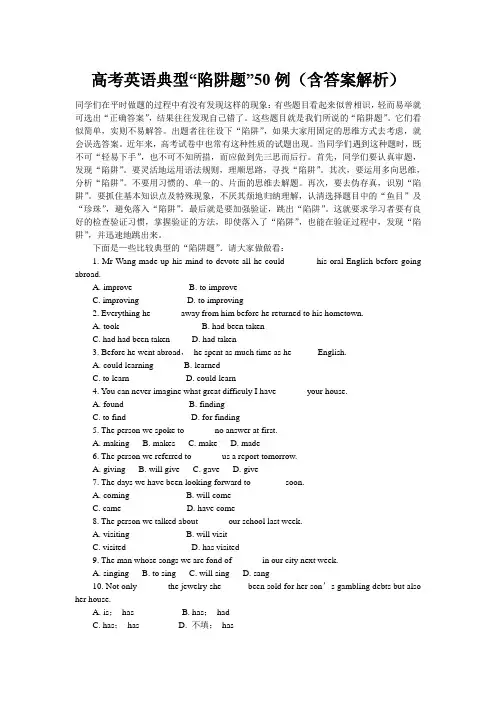
高考英语典型“陷阱题”50例(含答案解析)同学们在平时做题的过程中有没有发现这样的现象:有些题目看起来似曾相识,轻而易举就可选出“正确答案”,结果往往发现自己错了。
这些题目就是我们所说的“陷阱题”。
它们看似简单,实则不易解答。
出题者往往设下“陷阱”,如果大家用固定的思维方式去考虑,就会误选答案。
近年来,高考试卷中也常有这种性质的试题出现。
当同学们遇到这种题时,既不可“轻易下手”,也不可不知所措,而应做到先三思而后行。
首先,同学们要认真审题,发现“陷阱”。
要灵活地运用语法规则,理顺思路,寻找“陷阱”。
其次,要运用多向思维,分析“陷阱”。
不要用习惯的、单一的、片面的思维去解题。
再次,要去伪存真,识别“陷阱”。
要抓住基本知识点及特殊现象,不厌其烦地归纳理解,认清选择题目中的“鱼目”及“珍珠”,避免落入“陷阱”。
最后就是要加强验证,跳出“陷阱”。
这就要求学习者要有良好的检查验证习惯,掌握验证的方法,即使落入了“陷阱”,也能在验证过程中,发现“陷阱”,并迅速地跳出来。
下面是—些比较典型的“陷阱题”.请大家做做看:1. Mr Wang made up his mind to devote all he could ______ his oral English before going abroad.A. improveB. to improveC. improvingD. to improving2. Everything he ______ away from him before he returned to his hometown.A. tookB. had been takenC. had had been takenD. had taken3. Before he went abroad,he spent as much time as he _____ English.A. could learningB. learnedC. to learnD. could learn4. You can never imagine what great difficuly I have ______ your house.A. foundB. findingC. to findD. for finding5. The person we spoke to ______ no answer at first.A. makingB. makesC. makeD. made6. The person we referred to ______ us a report tomorrow.A. givingB. will giveC. gaveD. give7. The days we have been looking forward to _______ soon.A. comingB. will comeC. cameD. have come8. The person we talked about ______ our school last week.A. visitingB. will visitC. visitedD. has visited9. The man whose songs we are fond of ______ in our city next week.A. singingB. to singC. will singD. sang10. Not only ______ the jewelry she _____ been sold for her son’s gambling debts but also her house.A. is;hasB. has;hadC. has;hasD. 不填;has11. ______ in thought,he almost ran into the car in front of him.A. LosingB. Having lostC. LostD. To lose12. The research is so designed that once nothing can be’done to change it.A. beginsB. having begunC. beginningD. begun13. —What do you think made the woman so upset?—_______ weight.A. As she put onB. Put onC. Putting onD. Because of putting on14. Time should be made good use of ______ our lessons well.A. learningB. learnedC. to learnD. having learned15. It was only with the help of the local guide ______.A. was the mountain climber rescuedB. then the mountain climber was rescuedC. when the mountain climber was rescuedD. that the mountain climber was rescued16. Never ______ time come again.A. has lostB. will loseC. will lostD. lose17. —______ was it ______ they discovered the entrance to the underground palace?—Totally by chance.A. What;thatB. How;thatC. When;howD. Where;that18. I have nothing to confess. ______ you want me to say?A. What is it thatB. What it is whatC. How is it thatD. How it is that19. Is this factory ______ you visited the other day?A. the oneB. thatC. whereD.when20. Was it _____ she heard with her ears really made her frightened?A:what;that B. it;thatC. that;whichD. what;不填21. ______ what the six blind men said sounded!A. How foolishlyB. How foolishC. What foolishlyD. What foolish22. It was ______ the old clock that the old man spent the whole morning at home.A. repairB. repairingC. to repairD. in repair23. Is this hotel ______ you said we were to stay in your letter?.A. thatB. whereC. the oneD. in which24. Please tell me the way you thought of ______ the garden.A. take care ofB. to take care ofC. takinq care ofD. how to take care of25. A fast-food restaurant is the place _______,just as the name suggests,eating is performed quickly.A. whichB. whereC. thereD. what26. The film brought the hours back to me ______ I was taken good care of in that far-away village.A. untilB. thatC. whenD. where27. The professor has written another book,________ of great importance to cornputer science.A. which I think it isB. and I think isC. which I think isD. when I think is28. —Where do you think ______ he ______ the computer?—Sorry,I have no idea.A. had;boughtB. has;boughtC. did;buyD. 不填;bought29. We should do more such exercises in the future,I think,_____ those we did yesterday.A. asB. likeC. aboutD. than30. He will tell you _____ he expects will win such a match.A. whyB. whomC. whichD. who31. In New Zealand,I made lots of friends _____ a very practical knowledge of the English language.A. getB. togetC. gettingD. got32. I’m busy now. I’m sorry I can’t help _____ the flowers.A. watedngB. wateredC. watersD. to water33. Who would you rather ______ the report instead of you?A. have writeB. have to writeC. writeD. have written34. We must stop pollution ______ longer.A. livingB. from livingC. to liveD. live35. —Was it under the tree ______ you were away talking to a friend?—Sure. But when I get back there,the bike was gone.A. thatB.whereC. whichD. while36. Not far from the club there was a garden,______ owner seated in it playing bridge with his children every aftemoon.A. whoseB. itsC. whichD. that37. Wang Ling was elected ______ all he is the tallest.A. becauseB. because ofC. forD. as38. We’ll be free tomorrow,so I suggest ______ to the history museum.A. to visitB. visitingC. we should visitD. a visit39. I like swimming,while what my brother enjoys ______.A. cookingB. to cookC. is cookingD. cook40. Thank you for the trouble you have ______ to help me.A. paidB. takenC. hadD. asked41. Who is it up _______ decide whether to goor not?A. to toB. for forC. to forD. for to42. We keep in touch ______ writing often.A. withB. ofC. onD. by43. —How long have you been here?—______ the end of last month,A. InB. ByC.AtD. Since44. You should treat him (in) the way ______ suits him most.A. thatB. in whichC. 不填D. why45. He insisted that the sky ______ clear up the following day.A. wouldB. shouldC. 不填D. be46. He is a strict but kind-hearted father,______ the children respect but are afraid of.A.不填B. thatC. for whomD. one whom47. Mr Smith is ______ a good teacher ______ we all respect.A. such;thatB. such;asC. so;thatD. so;as48. ______ nice,the food was all eaten up soon.A. TastingB. TasteC. TastedD. To taste49. —You haven’t been to Beijing,have you?—______. And how I wish to go there again!A. Yes,t haveB. Yes,I haven’tC. No,I haveD. No,I haven’t50. He was sentenced to death ______ what he has stolen from the bank.A. thatB. sinceC. becauseD. because of答案及辨析1.此题中包含固定短语devote…to,其中to为介词,后面应接动名词。
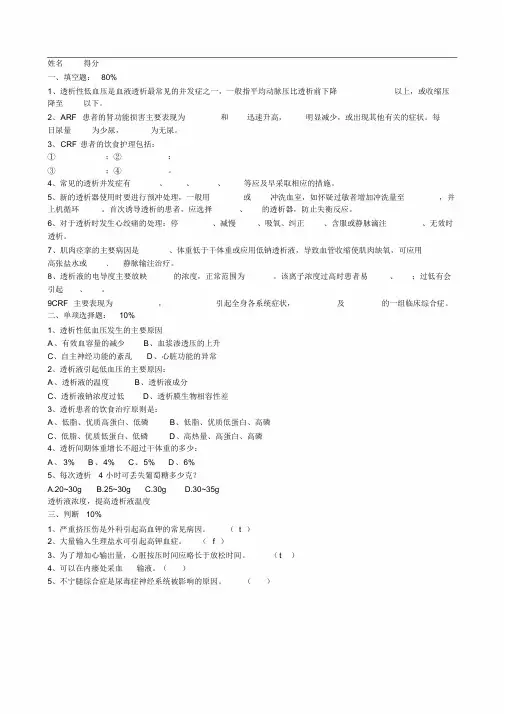
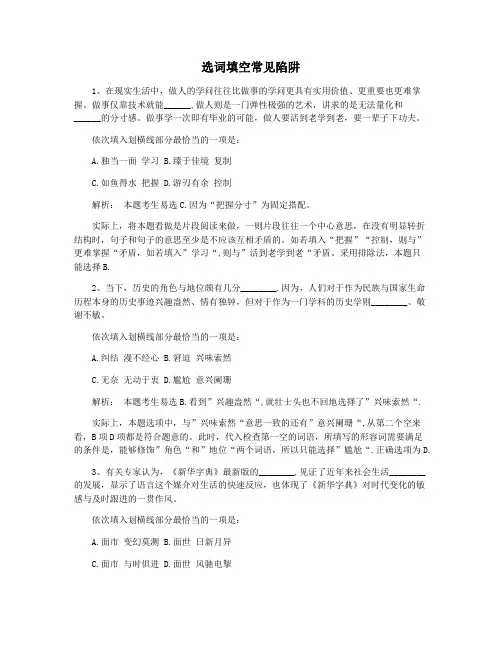
选词填空常见陷阱1、在现实生活中,做人的学问往往比做事的学问更具有实用价值、更重要也更难掌握。
做事仅靠技术就能______,做人则是一门弹性极强的艺术,讲求的是无法量化和______的分寸感。
做事学一次即有毕业的可能,做人要活到老学到老,要一辈子下功夫。
依次填入划横线部分最恰当的一项是:A.独当一面学习B.臻于佳境复制C.如鱼得水把握D.游刃有余控制解析:本题考生易选C.因为“把握分寸”为固定搭配。
实际上,将本题看做是片段阅读来做,一则片段往往一个中心意思,在没有明显转折结构时,句子和句子的意思至少是不应该互相矛盾的。
如若填入“把握”“控制,则与”更难掌握“矛盾,如若填入”学习“,则与”活到老学到老“矛盾。
采用排除法,本题只能选择B.2、当下,历史的角色与地位颇有几分________.因为,人们对于作为民族与国家生命历程本身的历史事迹兴趣盎然、情有独钟,但对于作为一门学科的历史学则________、敬谢不敏。
依次填入划横线部分最恰当的一项是:A.纠结漫不经心B.窘迫兴味索然C.无奈无动于衷D.尴尬意兴阑珊解析:本题考生易选B.看到”兴趣盎然“,就壮士头也不回地选择了”兴味索然“.实际上,本题选项中,与”兴味索然“意思一致的还有”意兴阑珊“,从第二个空来看,B项D项都是符合题意的。
此时,代入检查第一空的词语,所填写的形容词需要满足的条件是,能够修饰”角色“和”地位“两个词语,所以只能选择”尴尬“.正确选项为D.3、有关专家认为,《新华字典》最新版的________,见证了近年来社会生活________的发展,显示了语言这个媒介对生活的快速反应,也体现了《新华字典》对时代变化的敏感与及时跟进的一贯作风。
依次填入划横线部分最恰当的一项是:A.面市变幻莫测B.面世日新月异C.面市与时俱进D.面世风驰电掣解析:本题考生易选D.第二空后有”快速反应“,考生即刻选择D.实际上,看第二空,社会生活是这样的发展呢?问候用到了并列句式来描述,一是”快速反应“,另一个是”对时代变化的敏感与及时跟进“,选择”快速反应“与”与时俱进“都只是满足了并列的单一方面的描述。
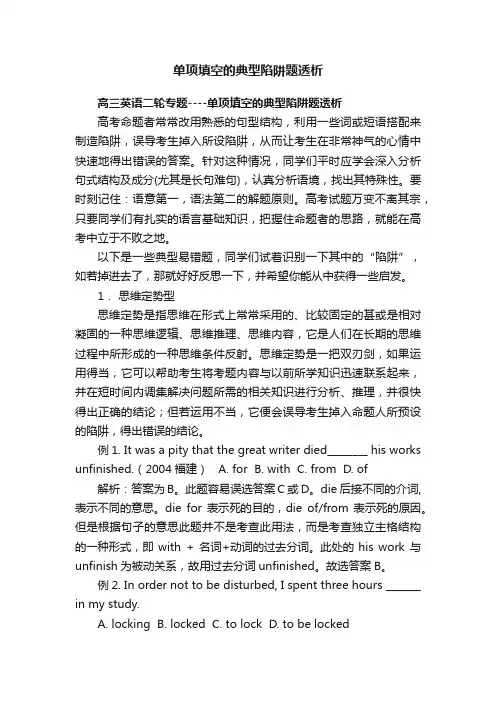
单项填空的典型陷阱题透析高三英语二轮专题----单项填空的典型陷阱题透析高考命题者常常改用熟悉的句型结构,利用一些词或短语搭配来制造陷阱,误导考生掉入所设陷阱,从而让考生在非常神气的心情中快速地得出错误的答案。
针对这种情况,同学们平时应学会深入分析句式结构及成分(尤其是长句难句),认真分析语境,找出其特殊性。
要时刻记住:语意第一,语法第二的解题原则。
高考试题万变不离其宗,只要同学们有扎实的语言基础知识,把握住命题者的思路,就能在高考中立于不败之地。
以下是一些典型易错题,同学们试着识别一下其中的“陷阱”,如若掉进去了,那就好好反思一下,并希望你能从中获得一些启发。
1.思维定势型思维定势是指思维在形式上常常采用的、比较固定的甚或是相对凝固的一种思维逻辑、思维推理、思维内容,它是人们在长期的思维过程中所形成的一种思维条件反射。
思维定势是一把双刃剑,如果运用得当,它可以帮助考生将考题内容与以前所学知识迅速联系起来,并在短时间内调集解决问题所需的相关知识进行分析、推理,并很快得出正确的结论;但若运用不当,它便会误导考生掉入命题人所预设的陷阱,得出错误的结论。
例1. It was a pity that the great writer died________ his works unfinished.(2004福建) A. for B. with C. from D. of 解析:答案为B。
此题容易误选答案C 或D。
die 后接不同的介词,表示不同的意思。
die for 表示死的目的,die of/from 表示死的原因。
但是根据句子的意思此题并不是考查此用法,而是考查独立主格结构的一种形式,即with + 名词+动词的过去分词。
此处的his work 与unfinish为被动关系,故用过去分词unfinished。
故选答案B。
例2. In order not to be disturbed, I spent three hours _______ in my study.A. lockingB. lockedC. to lockD. to be locked解析:答案为B。

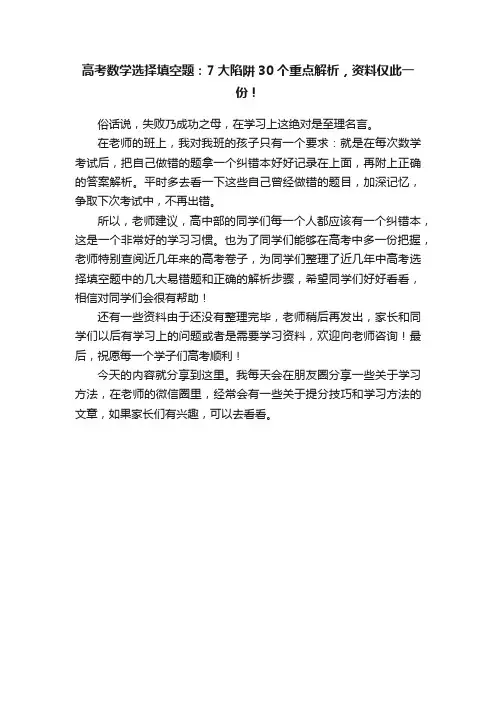
高考数学选择填空题:7大陷阱30个重点解析,资料仅此一
份!
俗话说,失败乃成功之母,在学习上这绝对是至理名言。
在老师的班上,我对我班的孩子只有一个要求:就是在每次数学考试后,把自己做错的题拿一个纠错本好好记录在上面,再附上正确的答案解析。
平时多去看一下这些自己曾经做错的题目,加深记忆,争取下次考试中,不再出错。
所以,老师建议,高中部的同学们每一个人都应该有一个纠错本,这是一个非常好的学习习惯。
也为了同学们能够在高考中多一份把握,老师特别查阅近几年来的高考卷子,为同学们整理了近几年中高考选择填空题中的几大易错题和正确的解析步骤,希望同学们好好看看,相信对同学们会很有帮助!
还有一些资料由于还没有整理完毕,老师稍后再发出,家长和同学们以后有学习上的问题或者是需要学习资料,欢迎向老师咨询!最后,祝愿每一个学子们高考顺利!
今天的内容就分享到这里。
我每天会在朋友圈分享一些关于学习方法,在老师的微信圈里,经常会有一些关于提分技巧和学习方法的文章,如果家长们有兴趣,可以去看看。
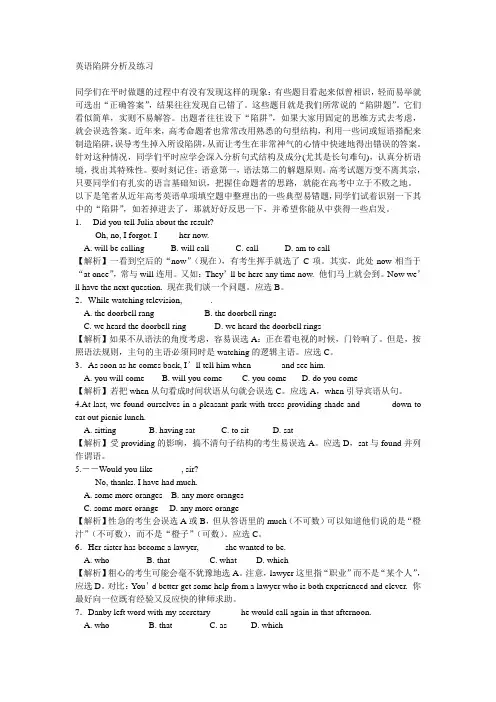
英语陷阱分析及练习同学们在平时做题的过程中有没有发现这样的现象:有些题目看起来似曾相识,轻而易举就可选出“正确答案”,结果往往发现自己错了。
这些题目就是我们所常说的“陷阱题”。
它们看似简单,实则不易解答。
出题者往往设下“陷阱”,如果大家用固定的思维方式去考虑,就会误选答案。
近年来,高考命题者也常常改用熟悉的句型结构,利用一些词或短语搭配来制造陷阱,误导考生掉入所设陷阱,从而让考生在非常神气的心情中快速地得出错误的答案。
针对这种情况,同学们平时应学会深入分析句式结构及成分(尤其是长句难句),认真分析语境,找出其特殊性。
要时刻记住:语意第一,语法第二的解题原则。
高考试题万变不离其宗,只要同学们有扎实的语言基础知识,把握住命题者的思路,就能在高考中立于不败之地。
以下是笔者从近年高考英语单项填空题中整理出的一些典型易错题,同学们试着识别一下其中的“陷阱”,如若掉进去了,那就好好反思一下,并希望你能从中获得一些启发。
1.----Did you tell Julia about the result?----Oh, no, I forgot. I ____ her now.A. will be callingB. will callC. callD. am to call【解析】一看到空后的“now”(现在),有考生挥手就选了C项。
其实,此处now相当于“at once”,常与will连用。
又如:They’ll be here any time now. 他们马上就会到。
Now we’ll have the next question. 现在我们谈一个问题。
应选B。
2.While watching television, ______.A. the doorbell rangB. the doorbell ringsC. we heard the doorbell ringD. we heard the doorbell rings【解析】如果不从语法的角度考虑,容易误选A:正在看电视的时候,门铃响了。
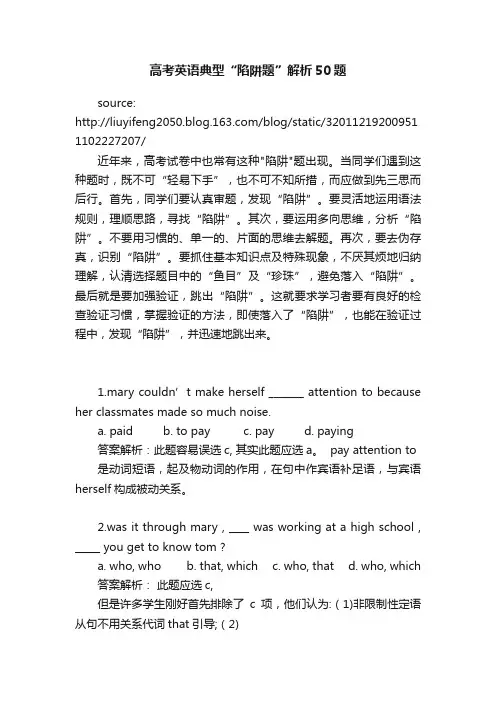
高考英语典型“陷阱题”解析50题source:/blog/static/32011219200951 1102227207/近年来,高考试卷中也常有这种"陷阱"题出现。
当同学们遇到这种题时,既不可“轻易下手”,也不可不知所措,而应做到先三思而后行。
首先,同学们要认真审题,发现“陷阱”。
要灵活地运用语法规则,理顺思路,寻找“陷阱”。
其次,要运用多向思维,分析“陷阱”。
不要用习惯的、单一的、片面的思维去解题。
再次,要去伪存真,识别“陷阱”。
要抓住基本知识点及特殊现象,不厌其烦地归纳理解,认清选择题目中的“鱼目”及“珍珠”,避免落入“陷阱”。
最后就是要加强验证,跳出“陷阱”。
这就要求学习者要有良好的检查验证习惯,掌握验证的方法,即使落入了“陷阱”,也能在验证过程中,发现“陷阱”,并迅速地跳出来。
1.mary couldn’t make herself _______ attention to because her classmates made so much noise.a. paidb. to payc. payd. paying答案解析:此题容易误选c, 其实此题应选a。
pay attention to 是动词短语,起及物动词的作用,在句中作宾语补足语,与宾语herself构成被动关系。
2.was it through mary , ____ was working at a high school , _____ you get to know tom ?a. who, whob. that, whichc. who, thatd. who, which答案解析:此题应选c,但是许多学生刚好首先排除了c项,他们认为:(1)非限制性定语从句不用关系代词that引导;(2)强调句型it be + 被强调部分+ that (who)…中,who (that)前不能有逗号。
上述两点是对的,在此句中wasit…that…也的确是强调句型,但句中的两个逗号不在强调句型中,它的作用是把非限制性定语从句who was working at a high school与句子其它部分分隔开来。

单项选择题做题方法、常见陷阱及解题技巧单项选择题做题方法、常见陷阱及解题技巧一、常用方法1、直接选定法。
即直接利用相关语法知识,通过题干中的已供信息,捕捉到解题线索,从而得出答案的解题方法。
如:1)-What are you going to do, Jane?-Oh, my mother asks me ____ some food for supper.A buyB to buyC buysD buying2)We have worked for three hours. Now let ’ s stop____a rest.3)This is a big class and ____ of the studentsare girls.A two thirdB second threeC two thirdsD two three4)– I ’ vehad enough bread ,would you like ______.A a few moreB one moreC anothermore D some more5)He has failed several times, but he wonA go onB come onC get upD give up ’ t __(BCCDD )此法主要用于较简单的试题,但必须要求对基本知识点,语法点熟练掌握。
2、关键词暗示法。
题目中的关键词对于快速而准确的判定答案起着至关重要的作用,找到句中的关键词,也就找到了解题的突破口。
如 :He hardly hurt himself in the accident, ______?A. doesn't heB. didn't heC. did heD. does he 该题中“hardly 与”“hurt 是”起关键词作用的。
凡陈述部分含有“hardly ”, “never,“”little ,“”few”等否定意义的词时,反意疑问句用肯定形式;而“ hurt 一”词的过去式与原形相同,此处“hurt未”加“s,”应为过去式。
文本解读新课程NEW CURRICULUM谈初中数学中考中的陷阱填空题高占芬肖丽(新泰市翟镇初级中学)初中数学中考测试题中,题型有选择题、填空题和解答题三种类型。
作为客观题的填空题,它和选择题同属客观性试题,它们有许多共同特点:其形态短小精悍、跨度大、知识覆盖面广、考查目标集中,形式灵活,答案简短、明确、具体,评分客观、公正、准确等。
填空题的类型一般可分为:完形填空题、多选填空题、条件与结论开放的填空题,是数学中考命题重要的组成部分。
因此,我们在备考时,既要关注这一新动向,又要做好应试的技能准备。
合情推理、优化思路、少算多思将是快速、准确地解答填空题的基本要求。
填空题不设中间分,一步失误,全题无分,而作为中档题的陷阱填空题,成了中考填空题中失分较为严重的问题,所以应充分利用分类讨论的数学思想,仔细审题、深入分析、正确推演、谨防疏漏。
此类问题的涉及,主要从以下几个方面总结:一、有关线段问题的陷阱例1.直线上有A、B、C三点,已知AB=8cm,BC=6cm,M、N分别是线段AB、BC的中点,则MN=。
【分析】如图1所示,此时,线段MN=BM+BN=12(AB+BC)= 7cm。
·····A MB N C图1如图2所示,此时,线段MN=BM-BN=12(AB-BC)=1cm。
·····A C M N B图2∴MN=7cm或1cm。
二、有关坐标系中的陷阱例2.如图3,点A的坐标为(3,4),若点P在x轴上,且△APO是等腰三角形,则点P图3图4【分析】分三种情况讨论:由勾股定理可得:OA=5,当OA=OP=5时,点P的坐标为(5,0)或(-5,0)。
当OA=AP=5时,点P的坐标为(6,0)。
当OA为底边时,点P即为OA的垂直平分线与x轴的交点。
如图4:由cos∠1=OE∶OA=OF∶OP可得:3∶5=2.5∶OP,则OP=256,∴点P的坐标为(256,0)。
高考英语典型“陷阱题〞50例〔含答案解析〕同学们在平时做题的过程中有没有发现这样的现象:有些题目看起来似曾相识,轻而易举就可选出"正确答案",结果往往发现自己错了。
这些题目就是我们所说的"陷阱题"。
它们看似简单,实如此不易解答。
出题者往往设下"陷阱",如果大家用固定的思维方式去考虑,就会误选答案。
近年来,高考试卷中也常有这种性质的试题出现。
当同学们遇到这种题时,既不可"轻易下手",也不可不知所措,而应做到先三思而后行。
首先,同学们要认真审题,发现"陷阱"。
要灵活地运用语法规如此,理顺思路,寻找"陷阱"。
其次,要运用多向思维,分析"陷阱"。
不要用习惯的、单一的、片面的思维去解题。
再次,要去伪存真,识别"陷阱"。
要抓住根本知识点与特殊现象,不厌其烦地归纳理解,认清选择题目中的"鱼目"与"珍珠",防止落入"陷阱"。
最后就是要加强验证,跳出"陷阱"。
这就要求学习者要有良好的检查验证习惯,掌握验证的方法,即使落入了"陷阱",也能在验证过程中,发现"陷阱",并迅速地跳出来。
下面是-些比拟典型的"陷阱题".请大家做做看:1. Mr Wang made up his mind to devote all he could ______ his oral English before going abroad.A. improveB. to improveC. improvingD. to improving2. Everything he ______ away from him before he returned to his hometown.A. tookB. had been takenC. had had been takenD. had taken3. Before he went abroad,he spent as much time as he _____ English.A. could learningB. learnedC. to learnD. could learn4. You can never imagine what great difficuly I have ______ your house.A. foundB. findingC. to findD. for finding5. The person we spoke to ______ no answer at first.A. makingB. makesC. makeD. made6. The person we referred to ______ us a report tomorrow.A. givingB. will giveC. gaveD. give7. The days we have been looking forward to _______ soon.A. comingB. will comeC. cameD. have come8. The person we talked about ______ our school last week.A. visitingB. will visitC. visitedD. has visited9. The man whose songs we are fond of ______ in our city next week.A. singingB. to singC. will singD. sang10. Not only ______ the jewelry she _____ been sold for her son's gambling debts but also her house.A. is;hasB. has;hadC. has;hasD. 不填;has11. ______ in thought,he almost ran into the car in front of him.A. LosingB. Having lostC. LostD. To lose12. The research is so designed that once nothing can be' done to change it.A. beginsB. having begunC. beginningD. begun13. - What do you think made the woman so upset?- _______ weight.A. As she put onB. Put onC. Putting onD. Because of putting on14. Time should be made good use of ______ our lessons well.A. learningB. learnedC. to learnD. having learned15. It was only with the help of the local guide ______.A. was the mountain climber rescuedB. then the mountain climber was rescuedC. when the mountain climber was rescuedD. that the mountain climber was rescued16. Never ______ time come again.A. has lostB. will loseC. will lostD. lose17. - ______ was it ______ they discovered the entrance to the underground palace?- Totally by chance.A. What;thatB. How;thatC. When;howD. Where;that18. I have nothing to confess. ______ you want me to say?A. What is it thatB. What it is whatC. How is it thatD. How it is that19. Is this factory ______ you visited the other day?A. the oneB. thatC. whereD.when20. Was it _____ she heard with her ears really made her frightened?A:what;that B. it;that C. that;which D. what;不填21. ______ what the six blind men said sounded!A. How foolishlyB. How foolishC. What foolishlyD. What foolish22. It was ______ the old clock that the old man spent the whole morning at home.A. repairB. repairingC. to repairD. in repair23. Is this hotel ______ you said we were to stay in your letter?.A. thatB. whereC. the oneD. in which24. Please tell me the way you thought of ______ the garden.A. take care ofB. to take care ofC. takinq care ofD. how to take care of25. A fast-food restaurant is the place _______,just as the name suggests,eating is performed quickly.A. whichB. whereC. thereD. what26. The film brought the hours back to me ______ I was taken good care of in that far-away village.A. untilB. thatC. whenD. where27. The professor has written another book,________ of great importance to cornputer science.A. which I think it isB. and I think isC. which I think isD. when I think is28. - Where do you think ______ he ______ the computer?- Sorry,I have no idea.A. had;boughtB. has;boughtC. did;buyD. 不填;bought29. We should do more such exercises in the future,I think,_____ those we did yesterday.A. asB. likeC. aboutD. than30. He will tell you _____ he expects will win such a match.A. whyB. whomC. whichD. who31. In New Zealand,I made lots of friends _____ a very practical knowledge of the English language.A. getB. togetC. gettingD. got32. I'm busy now. I'm sorry I can't help _____ the flowers.A. watedngB. wateredC. watersD. to water33. Who would you rather ______ the report instead of you?A. have writeB. have to writeC. writeD. have written34. We must stop pollution ______ longer.A. livingB. from livingC. to liveD. live35. - Was it under the tree ______ you were away talking to a friend?- Sure. But when I get back there,the bike was gone.A. thatB.whereC. whichD. while36. Not far from the club there was a garden,______ owner seated in it playing bridge with his children every aftemoon.A. whoseB. itsC. whichD. that37. Wang Ling was elected ______ all he is the tallest.A. becauseB. because ofC. forD. as38. We'll be free tomorrow,so I suggest ______ to the history museum.A. to visitB. visitingC. we should visitD. a visit39. I like swimming,while what my brother enjoys ______.A. cookingB. to cookC. is cookingD. cook40. Thank you for the trouble you have ______ to help me.A. paidB. takenC. hadD. asked41. Who is it up _______ decide whether to goor not?A. to toB. for forC. to forD. for to42. We keep in touch ______ writing often.A. withB. ofC. onD. by43. - How long have you been here?- ______ the end of last month,A. InB. ByC.AtD. Since44. You should treat him (in) the way ______ suits him most.A. thatB. in whichC. 不填D. why45. He insisted that the sky ______ clear up the following day.A. wouldB. shouldC. 不填D. be46. He is a strict but kind-hearted father,______ the children respect but are afraid of.A.不填B. thatC. for whomD. one whom47. Mr Smith is ______ a good teacher ______ we all respect.A. such;thatB. such;asC. so;thatD. so;as48. ______ nice,the food was all eaten up soon.A. TastingB. TasteC. TastedD. To taste49. - You haven't been to Beijing,have you?-______. And how I wish to go there again!A. Yes,t haveB. Yes,I haven'tC. No,I haveD. No,I haven't50. He was sentenced to death ______ what he has stolen from the bank.A. thatB. sinceC. becauseD. because of答案与辨析:1.此题中包含固定短语devote…to,其中to为介词,后面应接动名词。
高考英语单项填空陷阱题分类透析与演练高考命题者常常利用熟悉的句型结构,或者一些固定搭配来制造陷阱,让考生在非常神气的心情中快速地得出错误的答案。
针对这种情况,笔者粗略归纳了常见陷阱题的类型并加以分析,希望能对同学们在解题过程中巧识陷阱有所帮助.1.思维定势型思维定势是指人们在长期的思维过程中所形成的一种固定的思维模式。
它是一把双刃剑,如果运用得当,它可以帮助考生将考题内容与以前所学知识迅速联系起来,并在短时间内调集解决问题所需的相关知识进行分析、推理,并很快得出正确的结论;但若运用不当,它便会误导考生掉入命题人所预设的陷阱,得出错误的结论。
例1 In order not to be disturbed,I spent three hours ______ in my study。
A. lockingB. lockedC. to lockD。
to be locked解析:答案为B,但考生易误选A,以为是考查spend..。
(in)doing结构.其实,不是“锁门”花去了三小时,而是“将自己锁在书房里度过了三小时”,用过去分词短语作伴随状语。
2.规则硬套型就是指不从语言实际出发,不考虑特定的语言环境,而是机械地套用语法规则,生搬硬套语法的条条框框,从而错误地作出选择.例2 He made up his mind to devote his life ______poll ution______ happily.A. to prevent,to liveB. to prevent,from livingC. to preventing,to liveD. to preventing,living解析:答案为C,但易误选B,认为第一空应填to,是不定式符号,第二空是prevent..。
(from)doing sth。
是固定搭配。
其实devote .。
. to .。
. (把……奉献给……)中的to是介词,接—i ng形式;第二空也不是“阻止污染过上幸福生活”,而是“为了过上幸福生活而阻止污染",用不定式作目的状语。
单项填空典型陷阱题透析高考命题者常常改用熟悉的句型结构,利用一些词或短语搭配来制造陷阱,误导考生掉入所设陷阱,从而让考生在非常神气的心情中快速地得出错误的答案。
针对这种情况,同学们平时应学会深入分析句式结构及成分(尤其是长句难句),认真分析语境,找出其特殊性。
要时刻记住:语意第一,语法第二的解题原则。
高考试题万变不离其宗,只要同学们有扎实的语言基础知识,把握住命题者的思路,就能在高考中立于不败之地。
以下是笔者整理的一些典型易错题,同学们试着识别一下其中的“陷阱”,如若掉进去了,那就好好反思一下,并希望你能从中获得一些启发。
1. 思维定势型思维定势是指思维在形式上常常采用的、比较固定的甚或是相对凝固的一种思维逻辑、思维推理、思维内容,它是人们在长期的思维过程中所形成的一种思维条件反射。
思维定势是一把双刃剑,如果运用得当,它可以帮助考生将考题内容与以前所学知识迅速联系起来,并在短时间内调集解决问题所需的相关知识进行分析、推理,并很快得出正确的结论;但若运用不当,它便会误导考生掉入命题人所预设的陷阱,得出错误的结论。
例1. It was a pity that the great writer died________ his works unfinished.(2004福建)A. forB. withC. fromD. of解析:为答案为B B.例2. In order not to be disturbed,I spent three hours _______ in my study.A. lockingB. lockedC. to lockD. to be locked解析:答案为B.此题很容易误选A,以为是考查spend……(in)doing结构。
根据句意“为了不被打扰,例3. Mr Smith is______ a good teacher_______ we all respect.A. such,thatB. such,asC. so,thatD. so,as解析:答案spect后加上him一词,则应选A.2.规则硬套型所谓“规则硬套”,即指不从语言实际出发,不考虑特定的语言环境,而是机械地套用语法规则,生搬硬套语法的条条框框,同学们如果这样去学语言,那就难免出错了。
例4.He made up his mind to devote his life ___________pollution________ happily.A. to prevent,to liveB. to prevent,from livingC. to preventing,to liveD. to preventing,from living解析:e happily在句中用做目的状语。
例5.Mike’s father,as well as his mother,insisted that he _________at home.A. stayedB. could stayC. had stayedD. stay解析:ld +动词原形,should可以省略,只保留动词原形。
故选答案D.例6. If you want to go to see the movie,so_________ I.A. doB. amC. willD. should解析:件句,那么该结构中应用助动词shall/ will,如该题。
3.母语干扰型学外语最忌母语干扰,但由于母语在大脑中根深蒂固,所以常常会对外语学习者大脑中尚不牢固的外语知识产生负面影响,干扰学习者学习正确、地道的外语。
命题者也往往利用这一点,制造陷阱。
例7. I’ll come to see you if_______.A. you’re convenientB. it is convenient for youC. you feel convenientD. it is convenient with you解析:说if it is convenient for(to)you,其中的介词可用for或to,但一般不用with.例8. _________,the vitamin C in them will be destroyed.A. If vegetables are cooked too longB. If cooked too longC. If cooking too longD. If being cooked too long解析:语是vegetables,主句的主语是the vitamin C in them,因此不能省略。
故选答案A.4.插入隔离型有时一个本来很简单的句子,由于表达的需要,在其中置入一个插入成分,或将某些成分从正常位置调入一个在同学们看来属“非正常”的位置,则很有可能给同学们的理解带来困难(尤其是阅读能力不是很好的同学会更感困难)。
例9. Is there a shop around ________ we can buy some toilet articles?A. thatB. whichC. whereD. what解析:例10. Which do you enjoy _______ your weekends,fishing or watching TV?A. spendingB. to spendC. being spentD. spend解析:,to spend your weekends在该句中作状语,表示目的。
例11. He ran as fast as he could __________the bus.A. catchB. to catchC. catchingD. caught解析:the early bus,其中的不定式to catch the early bus 为目的状语。
5.借用倒装型英语句子的一般语序为“主语部分+谓语部分”。
如果把谓语放到主语前面,我们称之为倒装。
命题者就利用这种“不正常”的句式跟你“绕弯子”。
解决类似的题目,关键是要熟悉倒装规则,学会识别倒装句。
例12. _______he followed my advice,he would have succeeded.A. WhenB. IfC. HadD. Has解析:f,而将had,should,were提前置于句首。
这样的例子太多了,这里我们就不再罗列了。
希望同学们通过对这些典型陷阱题的学习和研究,能真正抓住陷阱题的本质,排除陷阱题中的干扰,学会识别陷阱的方法,掌握跳出陷阱的技巧。
以下是精选的典型题目,就请你“雾里看花”,“水中望月”,练练身手吧!1. _______smoking here will be fined.A. WhoB. WhomeverC. AnyoneD. Whoever2. After_______ seemed like hours he came out with a bitter smile.A. which B .it C. what D. that3. _______is known to everybody,the moon travels round the earth once every month.A. ItB. AsC. ThatD. What4. He is always really rude,______is why people tend to avoid him.A. thatB. itC. thisD. which5. He had a lot of friends,none of _______ could lend him any money.A. whomB. themC. whichD. who6. Mr. Smith is a painter,_______ I should also like to be.A. thatB. whichC. whoD. it7. According to the rules,students must not_______ their books during examinations.A. readB. watchC. noticeD. look at8. Every boy and girl_______ the book and they each________ to buy one.A. like,wantB. likes,wantsC. likes,wantD. like,wants9. _______is his favorite subject,but he doesn’t know _______ for “gongzuo”。
A. English,EnglishB. The English,the EnglishC. English,the EnglishD. The English,English10. China is larger than_______ country in Asia.A. anyB. any otherC. otherD. another11. Remind him_______ the window when he leaves.A. of closingB. closingC. to closeD. close12. You are right,we are not interested _______ to stories,but now we’d be interested _______your story.A. in listening,in hearingB. to listen,to hearC. in listening,to hearD. to listen,in hearing13. On Saturday afternoon,Mrs. Green went to the market,________ some bananas and visited her cousin.A. boughtB. buyingC. to buyD. buy14. It was 10 o’clock ________ the front do orbell rang.A. whereB. whenC. thatD. which15. ________,we went for a swim.A. Being hotB. It being hotC. As it is hotD. It was hot16. Before he went abroad,he spent as much time as he ________ EnglishA. could learningB. learnedC. to learnD. could learn17.——Did they all pass the driving test?——No,________ only three of them who passed it.A. there wasB. that wasC. there wereD. it was18. The “Two Cities” referred ________ London and Paris.A. is toB. to beC. to areD. to going to be19. This is the main use that the scientists make ________ of natural resources.A. itB. whichC. useD. /20.——Do you have anything more ________,sir?——No. You can have a rest or do something else.A. typingB. to be typedC. typedD. to type1。